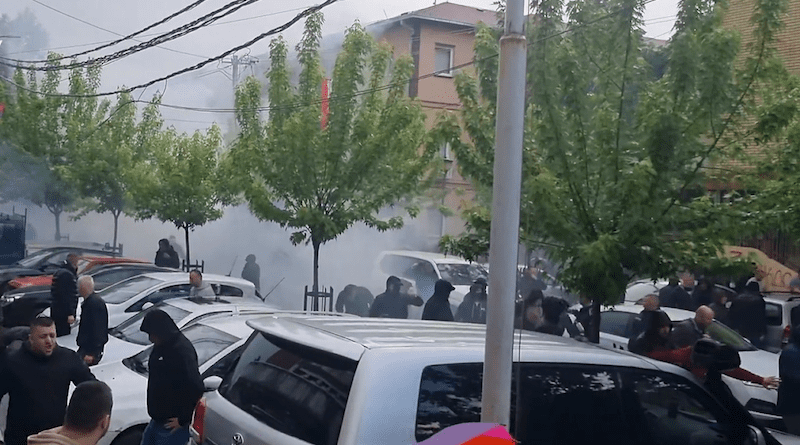US Blames Kosovo For Violence In North As Disputed Mayors Enter Offices
By Xhorxhina Bami and Sasa Dragojlo
One day after new Albanian mayors took their oaths of office in Serb-majority municipalities in the north of Kosovo, violence erupted between local Serbs and the police as locals attempted to stop the new mayors from entering their municipal buildings.
Police confirmed that five policemen were injured and Serbian language media report that dozens of citizens were also injured in clashes between locals and the police, where tear gas was used, gunshots were heard and police vehicles were burnt and damaged.
Local Albanian-language media Koha reported that the vehicle of their team was attacked with stones by masked persons but no one was hurt. The Kosovo Journalists Association asked the Kosovo Police and the international presence of KFOR and EULEX to ensure the safety of journalists
The US embassy harshly criticised the Kosovo authorities for using force to get the disputed mayors into their municipal buildings.
“The United States condemns the ongoing action by Kosovan authorities to access municipal buildings in the north of Kosovo. Today’s violent measures should be immediately halted,” ambassador Jeff Hovenier tweeted.
Local Serbs dispute the legitimacy of recent elections that they boycotted en masse and in which only 3.47 per cent of people voted.
Serbian broadcaster RTS reported in the hospital in the divided town of Mitrovica that ten people were injured in the conflict between the police and gathered citizens.
“Five policemen received slight bodily injuries. After receiving treatment, they returned on duty,” Kosovo Police spokesperson Baki Kelani told BIRN.
Around noon on Friday, the alarm that usually sounds before incidents in the Serb-majority north was heard in North Mitrovica.
Trucks like those that have previously barricaded roads to Kosovo’s borders with Serbia were placed close to the municipal building in Leposavic.
Kosovo’s Minister of Local Government, Elbert Krasniqi, said that after three mayors took their oaths yesterday, Friday was their first day of work.
“They have pledged to serve all citizens without any difference. As a ministry and as central institutions, we will give the new mayors our full support in performing their constitutional and legal obligations,” Kransiqi said.
“The municipality belongs to citizens. Citizens cannot remain without a municipality,” Krasniqi said on a statement shared in his Facebook account.
Despite the incidents in front of the municipality building, Zvecan’s new Mayor Ilir Peci told BIRN that he had entered the building. Police said they are helping mayors “to perform their right for work in official buildings”.
The Mayor of Zubin Potok, Izmir Zeqiri, also managed to enter his municipality building.
Meanwhile, Serbian President Aleksandar Vucic told the army shortly before 2 p.m. to raise combat readiness to the highest level, and from that moment the army began activities, Serbian Defence Minister Milos Vucevic said.
“An urgent movement towards the administrative line with Kosovo has been ordered,” Vučević told Pink TV live from the centre of Belgrade.
While the situation is tense in Zubin Potok, Leposavic and Zvecan, the newly elected mayor of North Mitrovica, Erden Atic, told BIRN: “I heard the alarm too, earlier.”
However he added that, “Today I am here, in the municipality building in the office. I don’t know more details, I’m here, working, I have meetings.”
Kosovo held extraordinary elections in the four Serb-majority municipalities in the north of North Mitrovica, Zvecan, Leposavic, and Zubin Potok, on April 23.
Local Serbs massively boycotted the elections. According to the Kosovo Central Election Commission, CEC, the turnout was only 3.47 per cent.

